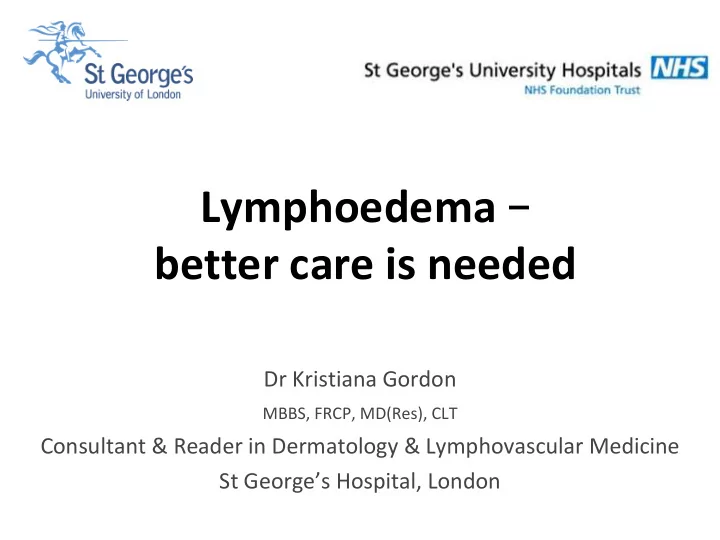

Lymphoedema – better care is needed Dr Kristiana Gordon MBBS, FRCP, MD(Res), CLT Consultant & Reader in Dermatology & Lymphovascular Medicine St George’s Hospital, London
Key Messages • Lymphoedema is a common, under- recognised condition, and often mismanaged in the community. • Treatment will improve quality of life and prevent complications, including recurrent infections. • Lymphoedema treatment should be made available by all Clinical Commissioning Groups (CCGs) to improve care and save money. Community care is preferable.
Who gets Lymphoedema? • It can affect newborns to the elderly – it does not discriminate! • It is chronic and incurable.
What is Lymphoedema? • Lymphoedema is the swelling of any body site (i.e. “chronic oedema”). • It develops when the lymphatic system cannot drain fluid properly from our tissues. • There are many causes: Ø > 1000 people/children affected by gene defects. Ø 25% of cases are due to cancer treatment. Ø Obesity, being immobile, inflammatory disease, blood pressure drugs, varicose veins, trauma...
How common is Lymphoedema? • More than 423,000 people in the UK are living with Lymphoedema • It is as common as Alzheimer’s disease, 4 times as common as HIV, and 12 times as common as Multiple Sclerosis. • 1 in 5 women with breast cancer will get it.
Can we treat Lymphoedema? • No evidence based Drug treatment • Physical Therapy: Ø Initial reduction in swelling = compression bandaging, manual lymphatic drainage massage, exercise, skin care Ø Maintenance treatment = compression garments, skin care, exercise, weight control
Can we treat Lymphoedema? • No evidence based Drug treatment • Physical Therapy: Ø Initial reduction in swelling = compression bandaging, manual lymphatic drainage massage, exercise, skin care Ø Maintenance treatment = compression garments, skin care, exercise, weight control • Prevention of recurrent infection with physical therapy and prophylactic antibiotics
Is Lymphoedema care available in your area? • Terrible inequality of lymphoedema care across the UK • Many CCGs discriminate and only offer care to patients with cancer-related lymphoedema • Several CCGs have NO commissioned lymphoedema services • Inability to access lymphoedema care causes unnecessary suffering, complications, and preventable costs to NHS
Why must we treat Lymphoedema? • Lymphoedema is associated with many health problems if left untreated: Ø cellulitis infections, often need hospital admission Ø wounds and leg ulcers Ø mobility problems, pain, psychological issues … • Management of complications is costly to the NHS • Early diagnosis and treatment is vital for achieving the best outcomes for the patient and the NHS
Cost of Cellulitis to the NHS • Cellulitis causes 400,000 bed days per year in UK • Costing approx £250 million per year • Cost savings can be made! • The introduction of a London lymphoedema service created 94% decrease in cellulitis incidence, with 87% reduction in hospital admissions that year. • Potential NHS saving of more than £200 million per year if we can deliver lymphoedema care to everyone.
Other savings to be made: • Improved care of lymphoedema would reduce the incidence of wounds / leg ulcers • Reduction in GP footfall, community nursing hours, wound care dressings and bandages. • Less wastage of incorrect compression garments provided by GPs and community nurses (estimated saving of £3 million per year)
What Needs to Happen: • Sufficient numbers of Lymphoedema treatment clinics within every CCG. • No discrimination between cancer-related and non- cancer related Lymphoedema. Equity is essential. • This will improve care and save £millions for the NHS. • Launch of the NLP Commissioning Guidance for Lymphoedema Services in 2019.
Recommend
More recommend